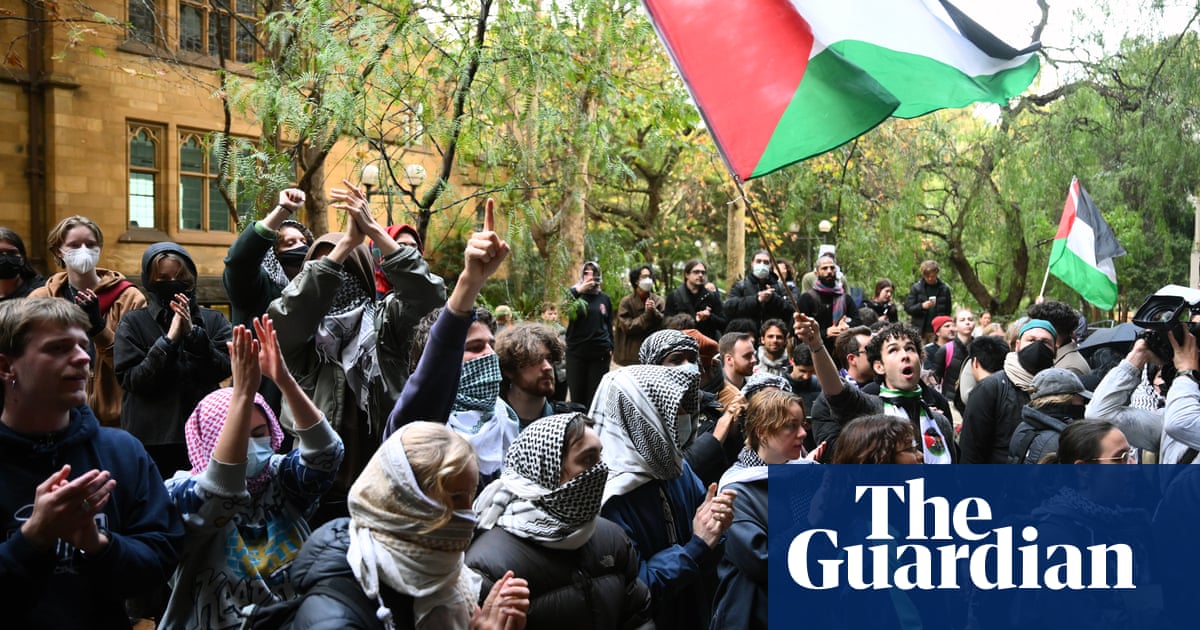Two University ofMelbournestudents have been recommended for expulsion and two for suspension for taking part in a pro-Palestine demonstration at the university’s Parkville campus last October.
If the decisions are upheld, the students will become the first pro-Palestine student activists for whom suspension and expulsion have been enforced in Australia since thewaves of student demonstrationsagainst Israel’s assault on Gaza began in 2023.
The students intend to appeal against the decision, with one telling Guardian Australia she believed the outcome had been “prejudged” by the university, which has implemented anti-protest rules thatcritics have characterised as “repressive”and an “authoritarian” overreach.
The students were referred to the institution’s disciplinary committee after reports they were part of a group of about 20 who, for about 90 minutes on 9 October, occupied the office of an academic they believed was integral to the university’s partnerships with the Hebrew University of Jerusalem.
The protesters were calling on the university to disband its joint programs with Israeli universities, which have been a target ofthe global boycott, divestment and sanctions movementsince 2004.
Footage of the occupation, distributed on social media at the time, showed protesters entering the office with their faces covered by keffiyehs, hoods and masks.
The university alleged the students had harassed and intimidated staff who worked in the office, damaged property by placing signs and stickers on some university-owned items including a monitor screen, and writing on and placing stickers on personal items of the academic, including a photo.
The students said their demonstration had been peaceful and clearly political, that they had informed people working in the office and nearby that they were protesting and had even offered to turn down the music they were playing so others could keep working.
Sign up for Guardian Australia’s breaking news email
One student facing expulsion, Niamh*, who spoke to Guardian Australia on condition that her real name not be used, was found by the disciplinary committee to have been present at the demonstration for no longer than 10 minutes.
Documents seen by the Guardian state she was not found to have performed any of the specific actions listed by the university as “harassing or intimidating” the staff, such as placing stickers or graffiti, but that her presence in the room with others was itself harassment and intimidation, and also constituted improper and unsafe use of university property.
The committee said they were recommending Niamh be expelled on the basis of “the seriousness of the breaches and the nature of the behaviour” and her past alleged breaches of the student conduct code. Niamh said she believed this was a reference to her participation in the“Mahmoud’s Hall” occupation of the Arts West building, a demonstration that led to the university agreeing to additional disclosures about its research project grant arrangements.
Niamh appeared to have been identified as being involved in the protest in part by the university tracking her location on campus through her wifi login, a tool that has beenthe subject of an investigationby the office of the Victorian information commissioner.
Sign up toBreaking News Australia
Get the most important news as it breaks
after newsletter promotion
She said she believed the activists had been “prejudged” by the university council, beginning with the then vice-chancellor, Duncan Maskell, circulatinga university-wide email the day after the protestcharacterising it as “an attempt to harass and intimidate” the academic.
Maskell’s email was criticisedin an open letter signed by 174 university staff members, which said the comments risked impeding procedural fairness and “enabled the action to be incorrectly framed by major media outlets as antisemitic”.
Maskell did not respond to the open letter.
In May last year he implemented new university rules banning “protest that is not peaceful” and prohibiting protesters who were not university staff or students from entering university grounds.
On 3 March his successor as vice-chancellor, Emma Johnston, implementedanother suite of rules against protests, including that they may not be held indoors and must not obstruct entries or exits of university buildings. The rules would apply to students and staff and also to “individual forms of action”.
The student union and the National Tertiary Education Union have called the new rules “an authoritarian approach” that erroneously conflates staff and student discomfort with lack of safety. The Human Rights Law Centre, Human Rights Watch and Amnesty International haveurged the universityto rescind them.
Niamh said Johnston’s rules were “particularly disturbing and hypocritical” and “a massive betrayal of the values and history of student unionism” given Johnston’s own history as the university’s student union president in the 1990s, when she advocated for direct action protests including sit-ins.
“Her words are irreconcilable with her actions when some of the worst anti-protest rules are being pushed through under her leadership,” Niamh said.
“I would love to see the university take more of an approach of wanting to sit down with their students and wanting to really hear from where their students are coming from and why students around the world feel this urgent moral necessity to stand against … the horrible atrocities we’re witnessing in Gaza as well as the West Bank and all of occupied Palestine,” she said.
A spokesperson for the University of Melbourne said it would not comment on individual cases “to protect the integrity of our disciplinary processes’”.
“The University of Melbourne has followed its disciplinary processes in accordance with University policy in response to an incident that took place in October 2024,” the spokesperson said.
“This process has not concluded. The University is communicating directly with individuals involved in disciplinary proceedings. Students have the right to appeal decisions made through the University’s disciplinary processes.”
Last year an Australian National University studentwho was expelledand a Deakin University studentwho was suspendedfor Palestine-related activism had those decisions overturned on appeal.
*Name has been changed
